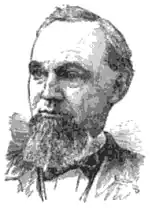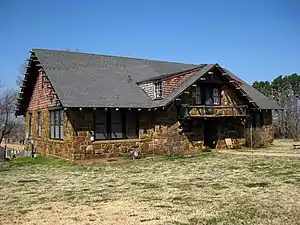Bacone College
Bacone College, formerly Bacone Indian University, is a private liberal arts college in Muskogee, Oklahoma. Founded in 1880 as the Indian University by Almon C. Bacone, Bacone College is the oldest continuously operated institution of higher education in Oklahoma. The college has strong historic ties to several tribal nations, including the Muscogee (Creek) Nation and the Cherokees, and also to the American Baptist Churches USA.
 | |
| Motto | A Place of Value & Opportunity |
|---|---|
| Established | 1880 |
Religious affiliation | American Baptist Churches USA |
| President | Ferlin Clark |
| Students | 270 |
| Location | , , United States |
| Campus | Suburban |
| Colors | Red and White |
| Athletics | NAIA – Independent |
| Nickname | Warriors |
| Website | www |
 | |
Bacone College is a member of the Higher Learning Commission of the North Central Association of Colleges and Schools, the Oklahoma Independent College Foundation and Universities, the Joint Review Commission for Radiography Education, the National League for Nursing, the National Association of Intercollegiate Athletics, and an affiliate member of the Oklahoma Association of Colleges for Teacher Education. Its current president is Dr. Ferlin Clark, a citizen of the Navajo (Dine) Nation and graduate of University of Arizona.
History

The college traces its origins to a request to the American Baptist Home Mission Society by Professor Almon C. Bacone, a missionary teacher, to start a school in the Cherokee Baptist Mission at Tahlequah, Indian Territory. Bacone had previously taught at the Cherokee Male Seminary established in Indian Territory.[1]
According to writer John Bartlett Meserve, Bacone College had its origins in a Baptist Mission school at Valley Town in North Carolina. That school became noted because of the work of Evan Jones, one of the earliest missionaries to the Cherokee. After most of the Cherokee were removed to Indian Territory, the Valley Town school moved to a site near what developed as the present town of Westville. In 1867, Evan Jones' son, John B. Jones, moved the school to Talequah. The mission school moved to Muskogee in 1885 and changed its name to Bacone.[2]
When he started Bacone College, Professor Bacone, the sole faculty, enrolled three students. By the end of the first semester, there were 12. By the end of the first year, the student population was 56 and the faculty numbered three.
Seeing the need to expand, he appealed to the Muscogee Creek Nation's Tribal Council for 160 acres (0.65 km2) of land in nearby Muskogee, known then as the "Indian Capital of the World". The land was granted, and in 1885 Indian University was moved to its present site. In 1910, it was renamed Bacone Indian University after its founder and first president. The Board of Trustees later changed the name to the current Bacone College, as it emphasizes undergraduate education.

The campus contains many reminders of Bacone's history, tradition, and goals. One of these is a small cemetery, where Bacone presidents Almon C. Bacone (1880–1896) and Benjamin D. Weeks (1918–1941) were buried, as well as others associated with the school over the years. On the west side of the campus is a stone pulpit marking the spot where Bacone, Joseph Samuel Murrow and Daniel Rogers, two Baptist missionaries who were also trustees of Indian University, knelt in prayer to dedicate the land received from the Creek to the Christian education of American Indians.
In the spring of 2018 the college experienced severe financial stress, firing most employees following commencement and publicly reporting that the college needed $2 million to complete the 2018-2019 academic year and open in the fall of 2019.[3] However, the school reopened after cutting programs, reducing faculty and selling property.[4] The college developed a plan to form a consortium of Oklahoma tribes to transition back to its roots as a tribal college, which would both give tribal governments ownership in the education of their students, and provide stable funding from the federal government in fulfillment of its trust responsibilities to educate American Indian students.[4] The United Keetoowah Band of Cherokee Indians in Oklahoma approved a charter agreement in April 2019,[5] and in July 2019, the Osage Nation announced that it would charter the school as a tribal college.[4] The school got its third charter in August 2019 from the Otoe-Missouria Tribe of Indians,[5] its fourth In September 2019 from the Cheyenne and Arapaho Tribes,[6] and its fifth in February 2020 from the Kiowa Tribe.[7] (The Muscogee (Creek) Nation, while originally chartering the school in the late 19th Century, has not done so this time because the tribe recently chartered its own separate college, the College of the Muscogee Nation.)[4]
Campus

One of the first buildings to be erected was Rockefeller Hall, a three-story building made possible by a $10,000 contribution from John D. Rockefeller. "Old Rock," as it came to be called, served as classroom, dormitory, dining hall, chapel, teacher quarters and administration building. It was razed in 1938 and a Memorial Chapel was built in its place. That was destroyed by fire but rebuilt in the 1990s. The historic buildings of the campus were listed on the National Register of Historic Places in 2014.
The campus contains many other reminders of Bacone's history, tradition, and goals. One of these is a small cemetery, the final resting place of Bacone presidents Almon C. Bacone (1880–1896) and Benjamin D. Weeks (1918–1941), as well as others associated with the school. A "stone bible" sculpture marks the spot on which President Bacone and Joseph Samuel Murrow and Daniel Rogers, two Baptist missionaries and trustees, knelt in prayer to dedicate the college. The names of all the college's presidents are inscribed on its surface.
Other structures on campus include The Indian Room at the Bacone College Library, which is the home of many of Almon C. Bacone original papers; the Ataloa Lodge Museum,[8] which has an impressive Native American art collection; and the McCombs Gallery, which features a large cross-section of Native American art. This includes artwork by alumnus, former director, and professor emeritus Richard "Dick" West (Cheyenne), an artist best known for his traditional Plains-style artwork, and Woody Crumbo, the only American Indian to receive the Julius Rosenwald Fellowship. Collectively, the traditional, flat-style painting movement developed by Blue Eagle, Crumbo, West, and others is known as the Bacone school.
In 2011 Bacone acquired the Northpointe Shopping Center. Renamed the Bacone Commons, the college moved important offices there, including the Campus library. The site was sold for $2.85 million as part of the College's 2018-2019 financial restructuring.[9]
Centers
Bacone College has three centers associated with the institution to help full fill the historical mission of the college.
Center for American Indians:
- Preservation of the American Indian Collections at Bacone College.
- Coordination of American Indian degrees and cultural programs.
- Research related to the future of American Indian education and collections in higher education.
Center for Christian Ministry:
- The broad umbrella for spiritual life on campus that helps the College to fulfill its mission as a four-year liberal arts college affiliated with the American Baptist Churches.
Center for Church Relations:
- As the churches support the college with students and scholarships, the center serves the churches by sending new leaders into the harvest field, providing training to non-traditional learners through online and off-campus education, assisting churches in their growth, providing music and preaching/teaching ministry to the churches for special events, and continuing education for church leaders.
Athletics
Bacone College teams, nicknamed athletically as the Warriors, are part of the National Association of Intercollegiate Athletics (NAIA), primarily competing independent of a conference affiliation. Until 2019, the college competed in the Sooner Athletic Conference (SAC), while its football team competed in the Central States Football League (CSFL) until the sport was discontinued in 2018. Men's sports include baseball, basketball, cross country, soccer and track and field; while women's sports include basketball, cross country, golf, soccer, softball, track and field and volleyball.
Bacone Baseball won the Junior College World Series in 1967; a school with total enrollment of 250 competed with schools that had over 20,000. They were led by coach Enos Semore, who went on to coach at Oklahoma for 23 years.
In 2018 Bacone dropped the football, volleyball, golf and rodeo teams. As of February 2020, the college has men's and women's basketball, softball, baseball, men's and women's soccer and men's and women's cross country teams.
Notable administration and staff
- Dean Chavers, Lumbee, President 1978-81
Notable faculty
- Mary Stone McLendon, Chickasaw educator, storyteller, and musician, founder of the Art Department and first director, 1932–1935.[10]
- Acee Blue Eagle, Muscogee Creek artist, Art Department Director, 1935–1938[10]
- Woody Crumbo, Citizen Potawatomi artist, Art Department Director, 1938–1941 and 1943–1945[11]
- Ruthe Blalock Jones, Shawnee/Peoria painter and printmaker, Art Department Director
- W. Richard West, Sr., Southern Cheyenne painter and sculptor, Art Department Director, 1947–1970
- Enos Semore, baseball, basketball, track, PE and intramural coach; head baseball coach Oklahoma 1968–89
Notable alumni
- Thomas Banyacya, Hopi traditionalist and activist
- Don Chandler, Class of 1954. Professional football player
- Eddie Chuculate, Muscogee (Creek)/Cherokee author
- Franklin Gritts, Cherokee Nation artist and art director of the Sporting News
- Enoch Kelly Haney, Seminole/Muscogee, Class of 1962. Politician, artist, and sculptor
- Sharron Ahtone Harjo, Kiowa artist and educator
- Patrick J. Hurley, an American soldier, statesman, and diplomat
- Joseph Medicine Crow (High Bird), Crow, tribal historian, author, and war chief
- Jack C. Montgomery, Cherokee World War II Medal of Honor recipient
- Alexander Posey, Muscogee (Creek), writer and humorist
- Daniel Roberts (fighter), NAIA All-American wrestler; professional mixed martial artist for the UFC[12]
- Willard Stone, sculptor (attended Bacone, later received honorary degree)
- Tyler Thomas, Canadian Football League player
- David E. Williams, Kiowa/Tonkawa/Kiowa-Apache artist
See also
- The Bacone College Historic District is on the National Register of Historic Places listings in Muskogee County, Oklahoma
Footnotes
- Thornton, Russell, ed. Studying Native America: Problems and Prospects. Madison: University of Wisconsin Press, 1999: 84. (retrieved through Google Books, 30 August 2009) ISBN 978-0-299-16064-7.
- Meserve, John Bartlett. "Chief Lewis Downing and Chief Charles Thompson (Oochalata). In: Chronicles of Oklahoma> Volume 16, Number 3. September 1938. Archived 2013-10-29 at the Wayback Machine Retrieved July 19, 2013.
- Justin Shrair (May 8, 2018). "Bacone College Closing, Laying Off Staff Unless Funding Is Found Soon". News on 6. Retrieved May 10, 2018.
- "Osage Nation to charter resurgent Bacone College". Tulsa World, July 6, 2019. Retrieved September 28, 2019.
- "Bacone College secures third tribe's charter in its goal to gain status as a tribal college". Corey Jones, Tulsa World, August 11, 2019. Retrieved September 28, 2019.
- "Cheyenne and Arapaho Tribes Agree to Charter Bacone College as a Tribal College". Bacone College, February 12, 2020. Retrieved May 3, 2020.
- "Kiowa Tribe becomes fifth to charter Bacone College". Bacone College, February 20, 2020. Retrieved May 3, 2020.
- "Ataloa Lodge Museum". Archived from the original on December 12, 2006. Retrieved November 26, 2006.
- "Bacone College seeks tribal status to bolster American Indian education opportunities while trying to regain financial stability". Corey Jones, Tulsa World, July 14, 2019. Retrieved October 9, 2019.
- Elder, Tamara R. "Ataloa (Mary Stone McLendon)". The Encyclopedia of Oklahoma History and Culture. Retrieved June 22, 2020.
- Hunt, David C. Crumbo, Woodrow Wilson (1912-1989). Oklahoma Historical Society's Encyclopedia of Oklahoma History and Culture. (retrieved 30 August 2009)
- "Daniel Roberts UFC".
Further reading
- Lisa K. Neuman, Indian Play: Indigenous Identities at Bacone College. Lincoln, NE: University of Nebraska Press, 2013.